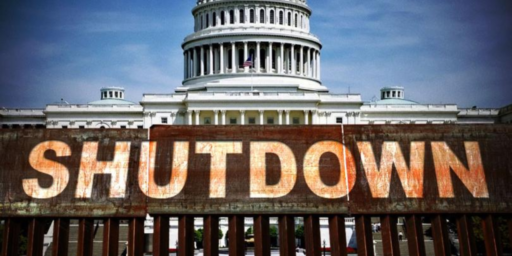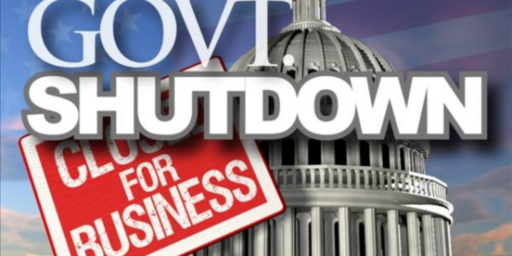An Observation about the Job Numbers
As Doug Mataconis beat me to noting, the July jobs were a bit better that expected (and May and June were slightly revised upward).
Via CNN’s write-up ( July jobs report: Hiring picks up), the following struck me (emphasis mine):
Businesses were busy hiring, adding 154,000 workers in the month, topping forecasts of 100,000 new jobs. But those gains were tempered by a loss of 37,000 government jobs, mostly from state and local governments, where budget shortfalls led to layoffs in July, especially in Minnesota where the government was briefly shut down.
Now, I understand that what we need primarily are private sector jobs. However, I think the above should remind us that government jobs are still, well, jobs. As such, some of the politicking that we, as a country (such as state government shutdowns, flirting with federal government shutdowns, the FAA impasse, etc.) have real economic effects. They aren’t pretend jobs with pretend economic effects just because they are in the public sector. The mortgage check written and the trip to Wal*Mart and all the other economic activity of the government employee matters as well.
I point out what ought to be obvious because when politicians (and many of their supporters) start engaging in various activities (like the petty FAA fight that is, thankfully, settled for the moment, or threatening to shutdown government) they often act as if there are no economic implications and seem to frequently ignore that real people with real jobs are involved.





I point out what ought to be obvious because when politicians (and many of their supporters) start engaging in various activities (like the petty FAA fight that is, thankfully, settled for the moment, or threatening to shutdown government) they often act as if there are no economic implications and seem to frequently ignore that real people with real jobs are involved.
It’s not a bug. It’s a feature.
I agree with the Tea Partiers that we need to eliminate a lot of government jobs, but from my viewpoint, there are two significant problems with the simplistic, “shut it all down, governments are bloated anyway” approach.
1) The government jobs that need to be cut are not in monolithic chunks, such that cutting off this funding for the FAA, for example, would eliminate the jobs that need to be eliminated and keep the ones that need to be kept. In regards to cutting the federal budget by 40% overnight by not raising the debt ceiling earlier this week, I sure don’t trust the Obama Administration to choose the right jobs to keep on duty and to furlough. Those that advocated this approach are, IMHO and at the risk of descending into ad hominem rhetoric, naive.
B. When (well, reality dictates this should read “If”) we identify the proper jobs to be eliminated, the RIF needs to be spread over time to give the business world the opportunity to absorb a significant portion of those government employees losing their jobs. This is not to say it wouldn’t be a rocky process anyway, but this is orders of magnitude better than dumping large number X unemployed onto the economy. Again, to believe otherwise seems to me to be naive.
@Boyd:
C. The argument “The government shouldn’t be doing X” is not the same as “No one should be doing X”. Transitioning certain services away from the government must necessarily involve a plan to transition those services to other organizations; that process is not the sort that can be done by the sort of “cold turkey” cutting the Tea Party seems to advocate.
Steve,
This is not a new feature. For the last year plus, the jobs data have shown private sector increases and public sector decreases. Steve Benen has been providing charts each month with private sector only and private and public sector combined. The tables give the lie to the Republican talking point that cutting the size of government is necessary to improve the economy.
@Stormy Dragon: I agree completely, but I was focusing on the employment aspect of the oft-proposed “policy.”
P.S. I think that paragraph should be numbered iii.
The question a few months ago wasn’t “should local governments have more workers?” but “should we raise taxes in order to allow local governments to have more workers?”
I knew my answer to that question would lead some people to change from public sector to private sector employment, and show up on unemployment numbers for a while. But, as you mentioned, “what we need primarily are private sector jobs.” Using reductio ad absurdium, if 100% of all jobs were public sector, who would pay taxes to pay for the workers?
Going the other way (raising taxes to support more government workers) isn’t guaranteed to lead to more jobs. Depending on which taxes were raised, it’s entirely possible that higher taxes would lead to higher private sector unemployment, and higher unemployment overall.
I wasn’t so naive to think that we could reduce local government sizes without affecting actual people’s lives. I believed, and still believe, that the benefits of having a smaller public sector and a larger private sector would outweigh the pain caused during the transition.
Using reductio ad absurdium, if 100% of all jobs were public sector, who would pay taxes to pay for the workers?
Do you think public sector workers don’t pay taxes?
I believed, and still believe, that the benefits of having a smaller public sector and a larger private sector would outweigh the pain caused during the transition.
Well, that depends on what else is happening during the transition. If we are, for example, in recession, then the harm done to the economy by throwing millions of people out of work may not be outweighed by the benefits.
@mantis:
Obviously they pay taxes. But any money paid to government workers must come from somewhere, and if that “somewhere” is only government workers (in my absurd example), then the money collected in taxes from government workers would have to equal the amount paid to government workers, i.e., the workers would have to pay 100% income tax.
I will agree in principle that whether it makes sense to grow or shrink the public sector (and by implication, to grow or shrink the private sector) depends on any number of things. I’m not a libertarian, and I believe it is possible for government to be too small (or, rather, I believe that government does provide useful benefits, but must have enough resources to do so). And, of course, I believe it is possible for government to be too large. In my statement, “smaller public sector” was meant as “smaller than we had”; ditto for the statement “larger private sector.”
The people “thrown out of work” by this particular readjustment should be capable of finding new jobs in the private sector. I would oppose efforts to prevent them from ever getting another job anywhere; but of course there are no such efforts.
I only want to point out the tradeoffs involved. Of course, sometimes balancing those tradeoffs will point one way, and sometimes it will point another. It’s possible that the Keynesian argument is correct that those former public sector employees will cut back on spending until they get new jobs, and the economy will fall further as a result. But it’s also possible that those employees weren’t contributing to the economy as much as they could have (that they were “under-performing assets” in Keynesian terms), and their new jobs may increase their contribution to the economy.
The only thing we can say for certain is that we didn’t increase taxes across the nation, something that would undoubtedly have been a significant drag on the economy.
mantis,
“Do you think public sector workers don’t pay taxes?”
Unless they pay 100% of their salary as taxes, then there isn’t enough tax revenue to pay the public sector workers. Which is why that was a reductio ad absurdium example.
As an example of “workers as under-performing assets”: my doctor has a receptionist on staff. Even if the doctor were a better receptionist than the one he hired, he makes a much larger contribution to the economy when he does doctoring stuff than when he answers the phones. Hiring a receptionist frees up his time so that he can make a larger contribution to the economy.
Getting the right people thinking about the right problems makes a huge contribution to the economy. Somebody on the egg licensing board ( http://www.coyoteblog.com/coyote_blog/2005/03/proud_holder_of.html ) is probably not thinking about the right problems to make a contribution to the economy. That same person thinking about how a large corporation could reduce their water usage by 5% a year is making a much larger contribution.
@Max Lybbert:
So do libertarians; otherwise, they’d be anarchists. The disagreement lies over where the line is.